‘My critics are narrow-minded bigoted bastards’: Is pokies billionaire Len Ainsworth the devil incarnate?
He has made billions from making poker machines and is about to turn 100. Len Ainsworth has lived a rich life, but he is defiant as always – and shows no sign of ever giving any ground to those that say he is evil.
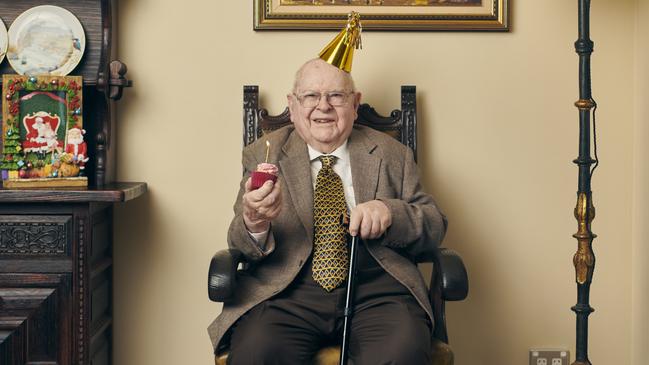
He’s had a notorious Sydney hit man try to blow him up, been raided and arrested, made a few billion dollars, spent 18 years in courts fighting corrupt cops, and been told he had months to live – only to survive for another 30 years (so far).
I’m talking to Len Ainsworth on the eve of his 100th birthday, and it is fair to say the country’s oldest billionaire has lived a rich life. Literally and figuratively.
Seventy years ago, Ainsworth started the company that would make him and his family rich beyond their dreams. And almost three decades ago he started another firm that was, incredibly, in direct competition – but it made him almost $500 million anyway.
Tracing the course of his life, there are plenty more stories: Ainsworth got his pilot’s licence in his sixties, once paid for liposuction with a few vintage pokie machines (the doctor was a keen antique collector) and used to joy-ride with a motorsport legend on weekends. He only gave up skiing in his early nineties.
One of Australia’s most generous philanthropists, financially backing dozens of good causes in education, health and the arts, Ainsworth has also sued at least one of his children.
Brilliant, bizarre, ruthless, generous, ultra-competitive, determined, funny, complex, much loved and admired – are all descriptions that have been applied to Ainsworth over the years. And they all fit.
A true business giant, he encapsulates an era when Australia made things. Ainsworth factories manufactured vending machines, dental chairs and supplies, even jukeboxes.
And poker machines.
A hell of a lot of poker machines.
He is the biggest and most successful maker in history of the machines that Australians lose more than $12 billion playing each year.
The machines have been responsible for a lot in post-war modern Australia, especially in NSW. Pokies have paid for community clubs and causes, funded junior sport and much of the hospitality industry. They have yielded billions in taxes to governments.
They have also caused untold devastation to individuals and families. More than half of the problem gambling in Australia is related to poker machine players; the knock-on effects include financial failure and even suicides due to the addictive nature of the machines.
When The Weekend Australian Magazine visits Ainsworth at his home in Sydney’s Hunters Hill on a sunny day weeks before he turns 100 in mid-July, Ainsworth doesn’t mince words when asked for his thoughts about those who say his actions have been evil. “It is offensive to me,” he says. “I feel that the people who criticise me are mainly people who are narrow-minded bigoted bastards, that’s what it comes down to. They need to get on with their own lives and not interfere with others.”
Ainsworth is a man of a certain time. When he started what would become Aristocrat Leisure – now a $25 billion global giant – in 1953, he says he had little inkling that pokies were addictive or anything but fun, “amusement at a cost”. He says it was also a time of personal responsibility. But we’re now living in a world of cancel culture, when parts of society are looking unkindly on people from previous eras who don’t fit their up-to-date tastes or opinions. There are no statues of Ainsworth to be toppled but his name is attached to universities, hospitals and other community causes.
Sitting at his dining table, wearing a suit and tie, munching on carrot cake for morning tea, a quick-witted Ainsworth is holding court and talking about his incredible life. Son Paul is beside him, and his full-time carer Margaret is nearby. Ainsworth has a walking stick, is a little hard of hearing and has just survived a bout of Covid, but he appears happy and in good health.
So is he the devil incarnate? “If they want to paint me that way, I don’t mind,” he says. “Besides which, they can all get stuffed.”
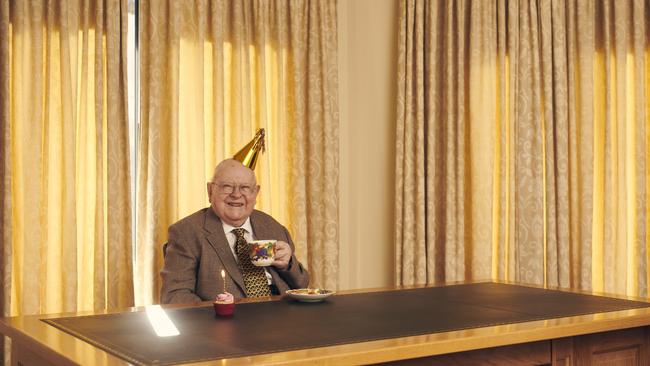
Ainsworth’s success traces back to starting Aristocrat 70 years ago, but he would go on to establish rival Ainsworth Game Technology in the mid-1990s and made that a big success too. He owns industrial properties and a growing storage business, and the family fortune was estimated at $4.24 billion in this year’s edition of The List – Australia’s Richest 250 in March.
Business commentator Robert Gottliebsen says Ainsworth is one of the titans of Australian business, a brilliant strategist who saw opportunities before his rivals did. “Len was able to be successful in an industry that is virtually recession-proof, highly regulated and has high barriers to entry,” he says. “It was very difficult to compete with him. And while people have legitimate critical views on poker machines, it is a business that is also legal and highly taxed.”
Approaching 100, Ainsworth seems a little frustrated that he can’t still be working hard. Son Paul says his dad describes work as a “hobby … so it doesn’t really feel like work”.
When asked what sets him apart from others, given his drive to build a huge business, Ainsworth says he was just born that way. But it is clear he is extremely determined, very competitive – “the opposition are only there to be eliminated,” he roars with laughter – and also ruthless. “I have this bug in me that says, ‘Make things.’ We are renowned as doers. Watch out we don’t do you,” he again laughs, albeit with a steely glint in his eye.
When pressed on how he is different to others, Ainsworth says: “My view of the average Australian is [that] he or she wants to get a job, get a nice car, get a home and then do f. k all else.” He likely means people are merely content, which he never is. “I see opportunities every day, just waiting for somebody to take them and they’re there for anybody to take. Now if people don’t see them, or don’t take them, then they’ve missed the opportunity. You’ve got to have balls to take them.”
But Ainsworth also says with vast wealth comes responsibility. Son Paul says his father has always had a giving nature, and would readily help employees who needed money or time off, and for decades did not pay himself a high wage, wanting to build the business instead.
“No use spending money for no purpose. Maybe your purpose is to make enough money to give it away. And I do give a lot away,” says Ainsworth. He has joined The Giving Pledge, whereby rich people pledge to give away much of their fortune, writing in 2017 that he would give at least half to philanthropic causes.

Ainsworth gave $10 million to the University of NSW to fund a new engineering building, and was a big donor for the Art Gallery of NSW’s Sydney Modern Project; there is an Ainsworth building at the Western Sydney University and an Ainsworth wing at Sydney Children’s Hospital, and he has backed several medical research institutes at the University of Sydney. There are dozens of other examples of Ainsworth’s giving.
Prominent Sydney businessman David Gonski is a supporter of the notion that wealthy people should give money to worthy causes, and as UNSW Chancellor and president of the Art Gallery of NSW Trust had direct interaction with Ainsworth and his family. “Len has been extremely kind to both organisations and he has been incredibly enthusiastic about his giving. He was very hands-on and a pleasure to deal with. He was never looking to interfere, merely looking to improve,” Gonski says.
Gambling reform campaigner Tim Costello, on the other hand, calls Ainsworth “Australia’s deadliest exporter” given his machines have been sold around the world, and says “though generous, Len has never supported any causes related to problem gambling or the damaging effects of poker machines”. Any defence of Ainsworth and the pokies, Costello says, is “like the National Rifle Association in America saying that guns don’t kill people, people kill people.”
Ainsworth is unmoved. “I really do think that we all have a responsibility to look after ourselves,” he says. “I mean, the person who goes and, shall we say, plays a poker machine and he has no money left to buy food or whatever is a fool. What do you do about fools? The answer is, there’s nothing much you can do about them.”
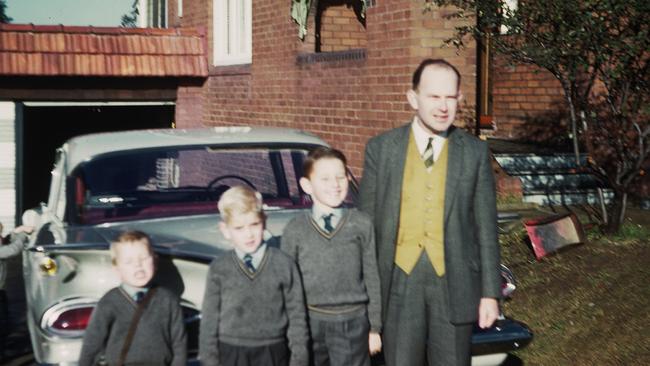
Ainsworth’s entry to the pokies sector, and his path to fortune, was fortuitous. Approaching the age of 30, he had been working at his father’s dental supplies business, transforming what had been something of a cottage industry for Ainsworth Snr into a thriving outfit. The young Ainsworth took on an English engineer named Joe Heywood – a hire that would change his career forever. “Joe came into me one day and said, ‘Have you ever thought of making a poker machine?’ My response was, ‘What’s that?’ and Joe had to explain to me they were in all the clubs. My response was, ‘What clubs?’ and he asked, ‘Where have you been all your life?’ I said, ‘Making bloody dental supplies!’”
It was 1953 and “playing the pokies” was illegal in NSW, as it was elsewhere in Australia, though authorities generally turned a blind eye to their use in the social and community clubs started by civic-minded groups and returned servicemen that were springing up around the suburbs. The clubs were popular, given they were able to gain extended liquor trading hours at a time when pubs had to close at 6pm. People flocked there to eat, drink and socialise – and to gamble on the newfangled “pokies”.
Heywood built a prototype poker machine for Ainsworth and before long the pair were producing them at the family dental supplies factory in Sydney’s Rosebery for what would become known as Aristocrat Leisure.
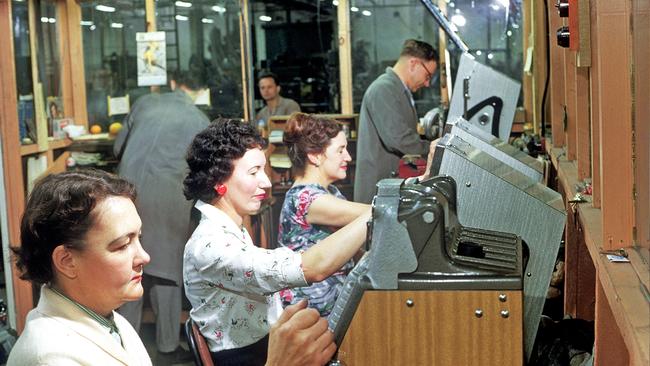
One rival wasn’t too happy with Ainsworth’s quickly-emerging business, though, and almost stopped it in its tracks. Raymond Smith – son of “Shark Arm” Smith, a murdered Sydney criminal whose severed arm was regurgitated by a shark in a Coogee aquarium – paid notorious standover man Lenny McPherson to blow up Ainsworth’s factory one fateful night in 1954.
Ainsworth received a call from Heywood, whose house adjoined the Aristocrat factory; he had smelled the ingredients of gelignite. By the time Ainsworth arrived, he found police, reporters, photographers and a hole in the factory roof; the damage from falling glass had just missed a stock of new machines fresh off the line. It was a close call. “There was a second parcel of gelignite attached to the first one by a string,” Ainsworth explains. “And the explosion from the first one blew out the fuse on the second. If the second one had gone off it would have flattened me.”
In a twist, Smith reneged on the deal to pay McPherson’s full £100,000 fee. When McPherson asked for the balance of his money, Smith told him he’d only done half the job – and subsequently had his brand-new American sedan blown up the next day outside his front door.
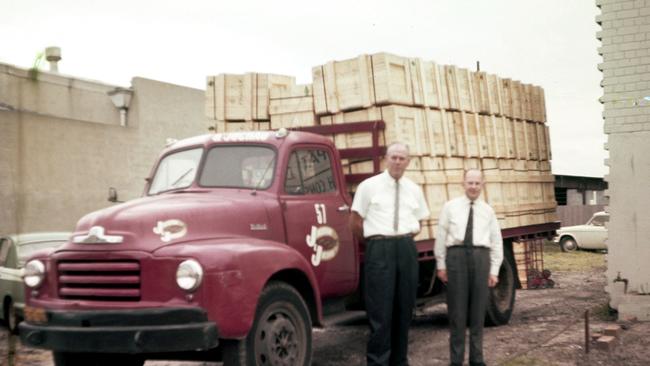
Ainsworth says it quickly became known around the industry that Smith had employed McPherson, so clubs stopped buying machines from Smith. Yet the ever pragmatic Ainsworth would end up helping out the very person who had tried to blow him up. “Smith ended up bankrupt not that long after. So I supplied him with machines and put him back into business,” Ainsworth says with a chuckle. “He ended up telling me that I was the best fellow he had ever met in his life. I had nothing against Smith. Well, he bombed me – but so what?”
Ainsworth says he quickly became export minded, and like many other Australians turned his attention to the United Kingdom. He enlisted the help of Jack Brabham, who would go on to become a motor racing superstar and win three Formula One world titles.
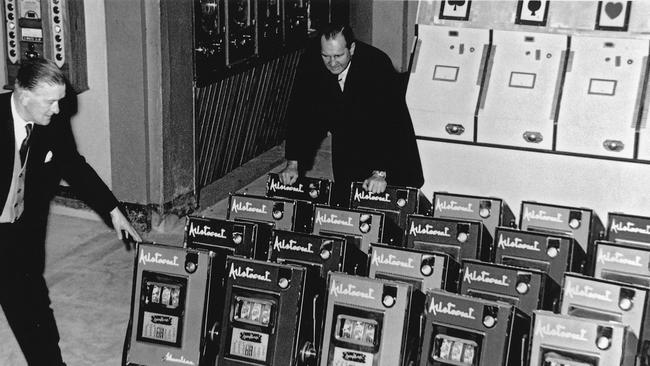
“Jack was a close personal friend and we’d go out motorcycling on the weekends and chasing girls,” Ainsworth explains while looking at an old photo of himself aboard his beloved Velocette MSS. “He had an uncanny touch. We’d come to a bend and he’d sail through it, whereas I would have to brake.”
Brabham would be Ainsworth’s sales representative in the UK until 1959, the year he won his first Formula One title, eventually telling the boss that motor racing was held in higher esteem than a job selling fruit machines in the Old Dart. By then Ainsworth was on a plane every few weeks to the UK to chase business, returning to Australia to oversee manufacturing operations in NSW. Ainsworth also made his first trip to the US, where he souvenired two large volumes of the Los Angeles phone book – a symbol, his sons believe, of his belief that America was a land of endless opportunity. His work ethic was relentless; meetings would be held at home into the night, and weekends would be spent visiting clubs and striking sales deals.
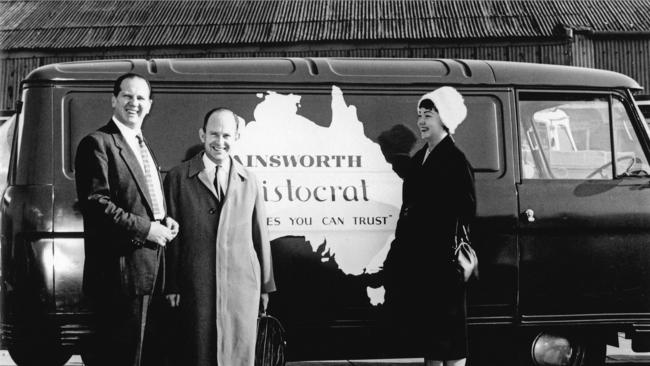
By 1959, Ainsworth’s first wife Bette had given birth to five sons in seven years. Ainsworth was a frequently absent husband who did little to help on the home front. “Well, I suppose that having a business of that nature interfered with my family life,” he says. “My first wife took on more than she knew. She was a good person, I shouldn’t knock her.”
The relentless work ethic and travel would take its toll, though. In the early 1960s, Ainsworth moved to the UK full-time to run the business there. He met German-born au pair Gretel Petersen, 19 years his junior, in London in 1965. They eventually married, and had a further two sons to add to the five from Ainsworth’s first marriage – or “series one and series two” as he describes it.
It is at this point in our conversation that Ainsworth shows some rare emotion, as tears well in his eyes when asked about Gretel – who left and divorced him after 50 years of marriage. “The second wife? I wouldn’t part from her for all the tea in China. She is a very lovely person. She’s a beautiful person.”
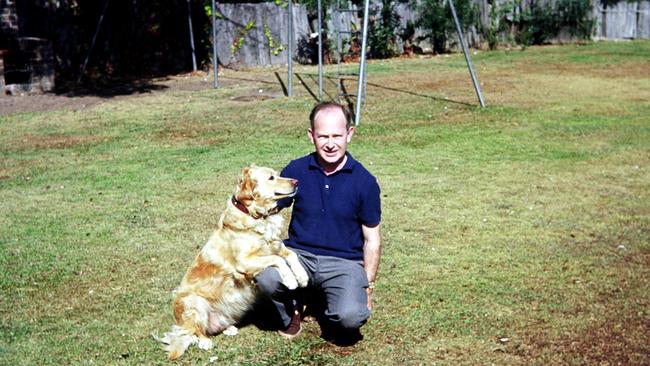
Paul Ainsworth (series one) remembers his father taking the family ice-skating, to the speedway at the old Sydney Showground, fishing for prawns by torchlight in Queensland and a time waterskiing at Surfers Paradise when the boys laughed as their father clowned around, “getting his skis tangled up and flailing about as if he was drowning”.
“Dad had a separate telephone on his desk just for the family and it did not matter what he was doing or who he was with, he unfailingly picked it up and spoke to me, my brothers and mother, even if it was to say he was tied up and had to ask to return the call a little later,” Paul says. “It remained a lifelong practice of his.”
Business would often be all-consuming, but there were lighter moments. Rugby league identity Phil Gould worked for Aristocrat for most of the 1980s, and remembers Ainsworth as a “gentleman and very generous man who respected everyone”. Some footy players had been unreliable employees so Gould kept his league playing a secret – even if he regularly came to the office with black eyes, bruises and stitches from his games – until one day Ainsworth stopped him on the stairs. “Young man, I don’t follow sport but I put the TV on last night and saw someone playing who looked just like you,” Gould recalls Ainsworth saying. “I said, ‘Boss, sorry yes that was me.’ He said, ‘Thank goodness. I thought you had a drinking problem,’ and off he went.”
The 1980s also heralded Ainsworth’s biggest challenge – one that elicits anger from him, even now. It was a time that son Paul says marks his father’s “lowest moment”. In 1980, Aristocrat made what was then its biggest sale: 150 machines for $650,000 to what is now the Ettalong Diggers club on the NSW Central Coast. The club’s profits increased and 20 more machines were bought, though there were assertions later made that an agent who made the sale hadn’t told them he was associated with Ainsworth’s business.
Ainsworth would be accused in NSW parliament in 1981 of paying secret commissions related to the Ettalong Diggers deal, and was later raided and arrested. He claims he was driven in his Rolls-Royce out to Penrith police station where he heard officers clearly say: “Now what are we going to charge him with?” He was then committed for trial.
A District Court would be told Ainsworth had conspired with an agent to commit a criminal offence but the Attorney-General would say that no bill of indictment would be filed.
Ainsworth by then had begun what was to be years of legal retaliation against the NSW police, lodging no less than 420 complaints against the police over 15 years including pursuing defamation action against several detectives, malicious prosecution and contempt of court.

“The police force itself was corrupt,” Ainsworth alleges. “They were paid off by local competitors. And when I started to get into Nevada, well, they caused issues with that too.”
Ainsworth would survive police appeals against four of his NSW licence applications in the mid-1980s before the full bench of the licencing court ruled him a “fit and proper” person to sell poker machines in NSW.
He had less success in Nevada, where he says a series of licence applications (Aristocrat was selling its machines there via a local agent) were denied due to information sent to the US gambling capital by NSW police each time he lodged paperwork.
By 1994, a former licensing investigation unit Detective, Robert Clark, would tell the NSW Supreme Court during one of several rounds of legal proceedings instigated by Ainsworth that “Ainsworth could not be convicted of any crime, is not a criminal and is not a leader of organised crime”.
“It pissed me off, of course,” Ainsworth says about his battles with the law. “But I think right is right and wrong is wrong. I believe I’ve always been a person of principle and I always will be. I have always fought these people who tried to do me over.”
The year 1994 would mark another defining moment. Ainsworth was diagnosed with prostate cancer and told he had about six months to live. With no clear succession plan he decided to divide his shareholding in the still private Aristocrat nine ways, splitting the stake between his seven sons, ex-wife and then wife.
However, Ainsworth’s cancer treatment was successful, and he was soon back at work. In a bizarre twist, the urologist who had given Ainsworth the news was himself dead within six months – from prostate cancer. Arranging his affairs, Ainsworth stepped away from the company he had created and installed professional management. He also inserted a clause in the share dispersal agreement that required the nine family members to forward him 80 per cent of the proceeds if they ever sold. It has meant they have mostly kept the shares since, though Ainsworth once sued son Kjerulf when he sold a parcel of stock without his permission.
Ainsworth had offered his advisory services to Aristocrat’s new management and board, but he was soon on the outer. Yet his stepping away cleared the way for Aristocrat to finally gain a licence to make poker machines in Nevada.
Aristocrat listed on the Australian Stock Exchange as a public company in 1996, crystallising the Ainsworth family wealth. All seven boys have worked in the company for a time, but they have no present ties today save for maintaining their considerable shareholding, and there were never any firm succession plans to pass down the business.

The company has stuck to another clause stipulated by Ainsworth in 1994: a requirement that it furnishes its founder with a new car of his choice every five years. He has variously driven a Rolls-Royce, an Audi, a Lexus or a Bentley ever since. A Porsche Cayenne now sits in Ainsworth’s garage, though he laments that his carer Margaret prefers to drive him around in a more comfortable Subaru Forester.
The agreement has been maintained even when, extraordinarily, at the age of 72 and restless, Ainsworth went into competition against Aristocrat after recovering from cancer.
Effectively it meant the wider Ainsworth family was locked into keeping their Aristocrat shares under heavy threat of legal action from Ainsworth, while he went into direct competition with the company they couldn’t sell out of without heavy financial penalty.
Ainsworth Game Technology would list on the ASX, and also gained a Nevada licence. In 2016, Ainsworth agreed to sell most of the shares in the company to Austrian giant Novomatic and its billionaire boss Johann Graf, dubbed “Deus ex Automatica”, or “God of the Slot Machines”. Ainsworth received a $473 million cheque as part of the deal.
Perhaps that sale has softened things with his old company in recent times. Aristocrat CEO Trevor Croker recently dropped in on Ainsworth at his home to pay homage. “Len is simply one of a kind. [He] not only set the trajectory of our business, but also changed the gaming industry,” Croker says.
“His family approach to doing business inspires a lot of loyalty, to this day. We’re proud to have built on Len’s extraordinary legacy expanding into a global business and we wish him a very happy 100th birthday.” Meanwhile, Ainsworth isn’t sure he has even retired. He is still a keen investor and wants to expand his Angel self-storage business.
“I like to keep my finger on things, because I enjoy it. Not because of the money. There’s that thing ticking in there that says ‘Make something, make something, make something …’ I just have to take notice of it. It doesn’t stop ticking. They’ll have to bury it with me.”
And then Ainsworth is joking again – “My own future is down, down, down,” he says, pointing to the ground – and says while he wouldn’t mind being younger, he is “not obsessed with the idea”.
When asked if he is happy, Ainsworth says yes, but adds: “There’s lots of things to be done,” and, on his dedication to work, says: “I’m unfortunate. I enjoy work. I’m trapped.”
Would he do anything differently if he had his time again? “Probably not,” he says, before adding that life is like a game of whack-a-mole where “you hit something down and then something else pops up”.
“I’d like to be thought of as a decent person who tried to help others. That just about sums it up, really. And I have given a lot – universities, hospitals and healthcare and so on. It is important and I enjoy doing it.”
Does he think the benevolence comes as a result of being a guilty soul due to the poker machines? “No, not at all. I don’t care about my reputation,” he replies.
Len Ainsworth, defiant and pugnacious – to the end.



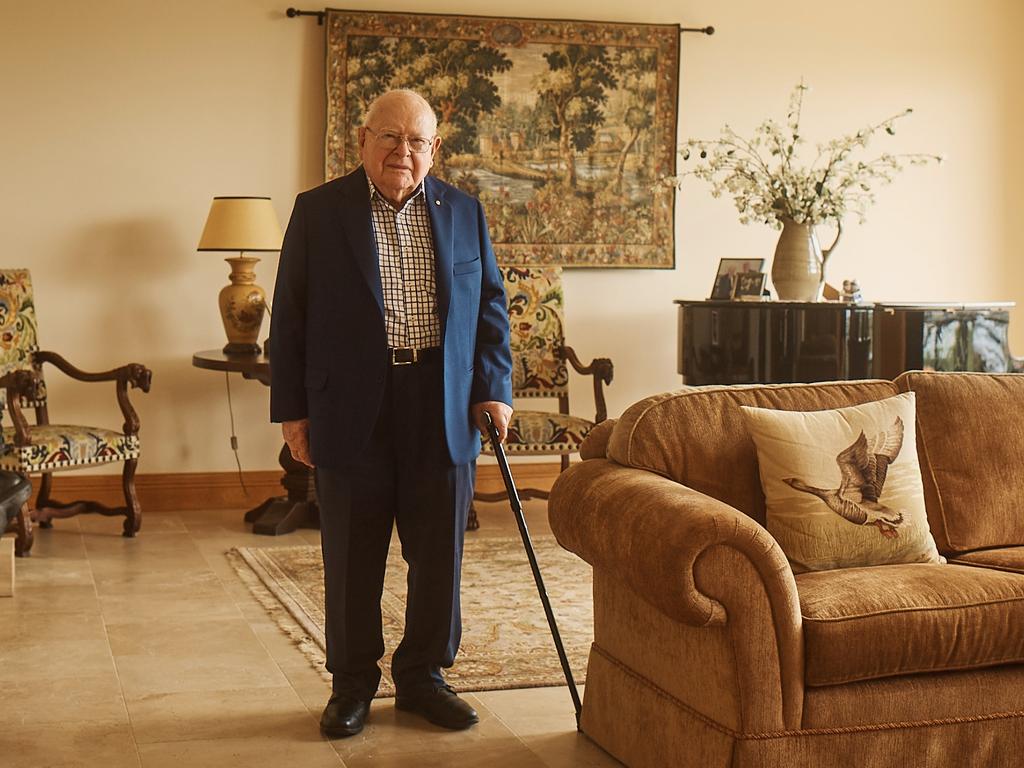


To join the conversation, please log in. Don't have an account? Register
Join the conversation, you are commenting as Logout